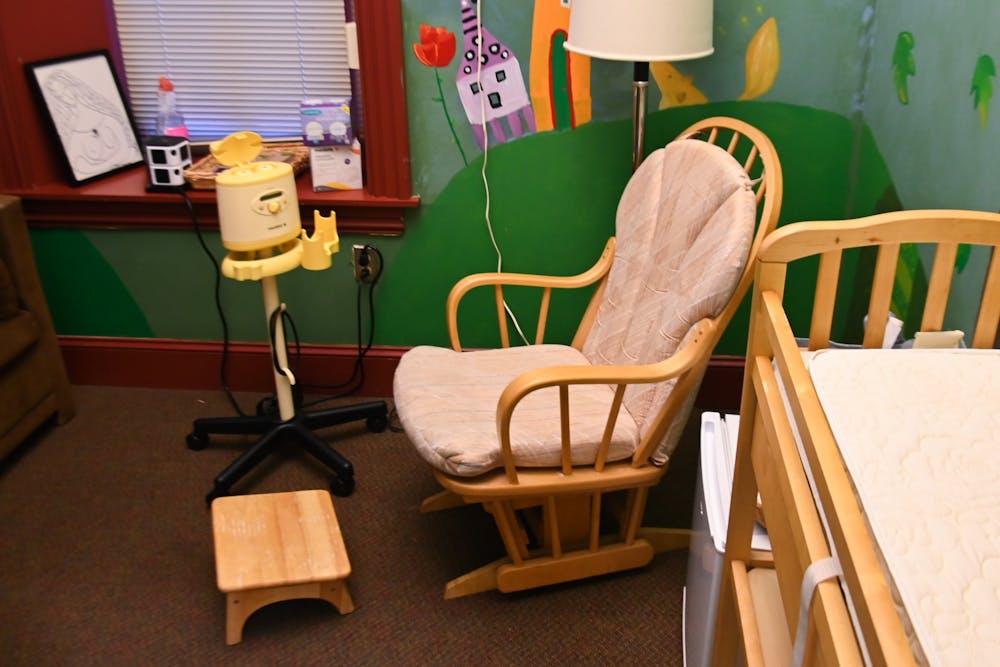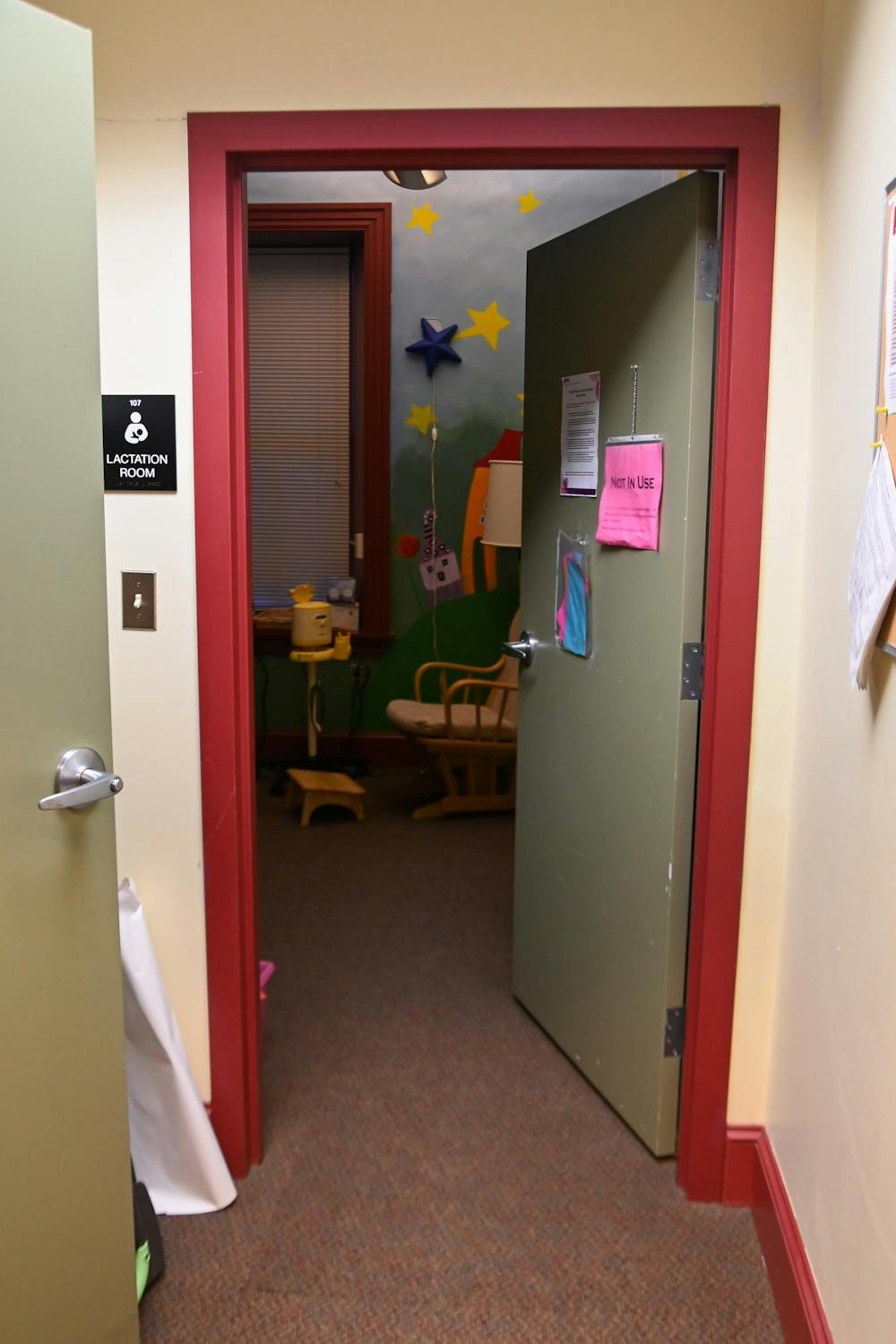
The lactation room at Penn Women's Center is private, with comfortable seating and a hospital grade breast pump.
Credit: Maria MuradSince the University declared the creation of additional lactation spaces “an official priority” in 2011, the number of areas where women can pump breast milk on campus has increased from four rooms in 2010 to approximately 60 rooms in 35 buildings in 2020.
Penn Women's Center has been pushing to install more lactation spaces for new mothers who struggle to find a space to breastfeed their child or pump breast milk on campus.
Penn Women's Center Director Sherisse Laud-Hammond said that the number of free breast pump attachment kits distributed by Penn Women’s Center through their Pump-Kit Giveaway Program has nearly tripled in the past three years. She added that PWC hopes to increase student awareness of these lactation resources and solicit funding to expand the initiative. She said the pump kits cost approximately $35 each.
Many of the lactation spaces on campus have hospital grade Medela Symphony breast pumps that are provided by PWC, the buildings that are home to the spaces, or grant funding, which PWC’s Associate Director Elisa Foster described as unique to Penn compared to other universities and workplaces. The spaces are private rooms, often about the size of a single-use bathroom, with comfortable seating where women can pump.
“Most workplaces you’re lucky to have an easily accessible room to go to,” Foster said. “Most women have to bring their pump from home and commute with it back and forth.”
Last year, Penn added a lactation room at 3535 Market St., which is home to Student Health Service, and a mobile lactation suite at Penn Dental's Robert Schattner Center.
Laud-Hammond said that for women who leave their breast pumps at home, PWC distributes free breast pump kits as part of their Pump-Kit Giveaway Program to any student, staff, or faculty member who requests one for use in a lactation space. The pump kits are for use by individual women and can be attached to the breast pumps located in the lactation spaces. In 2019, PWC distributed 71 kits, almost three times as many as the 26 kits distributed in 2016, Laud-Hammond added.
There are now approximately 60 lactation rooms in 35 buildings on campus.
“We won’t let you not pump during the day,” Foster said. “That’s another thing that’s really significant about some of the work we’re doing is that we were able to supply those resources as well.”
In order to keep up with increasing demand for breast pump kit attachments, Laud-Hammond said she is confident that PWC will be able to obtain more funding to sustain the initiative.
“I think that [lactation] is becoming a priority for a lot of folks,” Laud-Hammond said. “That’s one of the reasons why I know that we’ll be able to secure more funding.”
Laud-Hammond and Foster said one of the PWC's main goals is to make sure that members of the Penn community know that these lactation resources exist, which they hope to achieve through more outreach programming. PWC has partnered with Penn Human Resources and the Family Resource Center to offer breastfeeding education sessions since 2013, according to Human Resources Senior Work-Life Consultant Karen Kille.
Foster added that PWC is particularly interested in increasing student awareness, because the primary users of lactation spaces have been faculty and staff. In 2019, over 70% of individuals who used the breast pump kits were faculty and staff, according to statistics provided by PWC.
One of the PWC's main goals is to make sure the Penn community knows that the lactation resources exist.
College senior Bianca Owusu said she was unaware of the lactation spaces on campus but recognized the importance of having these resources available to the Penn community.
"It's all a part of women's rights," Owusu said. "[Women] should feel free to take care of the kids and do what they need to do."
Family Resource Center Director Jessica Bolker said that the two lactation rooms in the center are open to all members of the Penn community. Bolker added that Penn has come a long way in adding more lactation spaces on campus since 2010, when the Family Resource Center was home to one of only four lactation rooms on campus.
“There’s certainly still some work to be done,” Bolker said. “There are some gray spots on the map, some challenges for certain faculty and students where there isn’t space where they are, so they’re walking a bit.”
Bolker said that in an ideal world, there would be a lactation space in every building on campus, although she recognizes that there are spatial limitations.
Foster, who was working at PWC while breastfeeding, said she had the ideal situation with a hospital grade breast pump, lactation space, running water, comfortable chairs, and supportive colleagues in the building where she worked. She described the experience, however, as also “one of the most difficult things” she has had to do.
“So anyone else who doesn’t have even one or two of those things is struggling,” Foster said. “They might not say that they’re struggling, but it’s really hard.”
Foster said that providing ample lactation resources to the Penn community is a matter of reproductive justice, which she said includes "having the decision and ability to say for yourself that you are going to breastfeed your child."
“Part of our mission for gender equity and gender justice is to involve ourselves and advocate for women to make sure that they have what they need to get through the day at work,” Laud-Hammond said.
The Daily Pennsylvanian is an independent, student-run newspaper. Please consider making a donation to support the coverage that shapes the University. Your generosity ensures a future of strong journalism at Penn.
Donate




